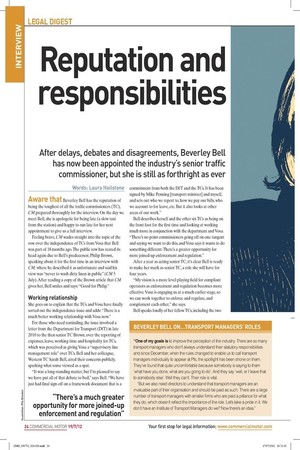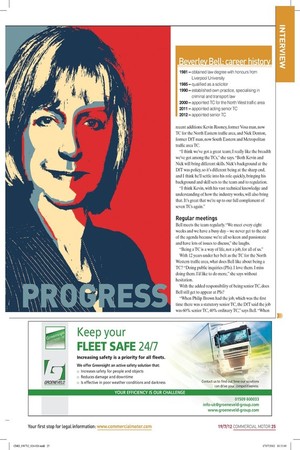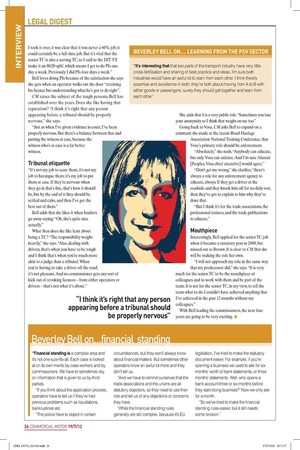Reputation and responsibilities
Page 16

Page 17

Page 18

If you've noticed an error in this article please click here to report it so we can fix it.
After delays, debates and disagreements, Beverley Bell has now been appointed the industry’s senior traffic commissioner, but she is still as forthright as ever
Words: Laura Hailstone Aware that Beverley Bell has the reputation of being the toughest of all the trafic commissioners (TC), CM prepared thoroughly for the interview. On the day we meet Bell, she is apologetic for being late (a slow taxi from the station) and happy to run late for her next appointment to give us a full interview.
Feeling brave, CM wades straight into the topic of the row over the independence of TCs from Vosa that Bell was part of 18 months ago. The public row has reared its head again due to Bell’s predecessor, Philip Brown, speaking about it for the irst time in an interview with CM, where he described it as unfortunate and said his view was “never to wash dirty linen in public” (CM 5 July). After reading a copy of the Brown article that CM gives her, Bell smiles and says: “Good for Philip.”
Working relationship
She goes on to explain that the TCs and Vosa have inally sorted out the independence issue and adds: “There is a much better working relationship with Vosa now.” For those who need reminding, the issue involved a letter from the Department for Transport (DfT) in late 2010 to the then senior TC Brown, over the reporting of expenses, leave, working time and hospitality for TCs, which was perceived as giving Vosa a “supervisory line management role” over TCs. Bell and her colleague, Western TC Sarah Bell, aired their concerns publicly, sparking what some viewed as a spat.
“It was a long-standing matter, but I’m pleased to say we have put all of that debate to bed,” says Bell. “We have just had inal sign-off on a framework document that is a commitment from both the DfT and the TCs. It has been signed by Mike Penning [transport minister] and myself, and sets out who we report to, how we pay our bills, who we account to for leave, etc. But it also looks at other areas of our work.” Bell describes herself and the other six TCs as being on the front foot for the irst time and looking at working much more in conjunction with the department and Vosa. “There’s no point commissioners going off on one tangent and saying we want to do this, and Vosa says it wants to do something different. There’s a greater opportunity for more joined-up enforcement and regulation.” After a year as acting senior TC, it’s clear Bell is ready to make her mark as senior TC, a role she will have for four years.
“My vision is a more level playing ield for compliant operators as enforcement and regulation becomes more effective. Vosa is engaging us at a much earlier stage, so we can work together to enforce and regulate, and complement each other,” she says.
Bell speaks fondly of her fellow TCs, including the two recent additions: Kevin Rooney, former Vosa man, now TC for the North Eastern trafic area, and Nick Denton, former DfT man, now South Eastern and Metropolitan trafic area TC.
“I think we’ve got a great team; I really like the breadth we’ve got among the TCs,” she says. “Both Kevin and Nick will bring different skills. Nick’s background at the DfT was policy, so it’s different being at the sharp end, and I think he’ll settle into his role quickly, bringing his background and skill sets to the team and to regulation.
“I think Kevin, with his vast technical knowledge and understanding of how the industry works, will also bring that. It’s great that we’re up to our full complement of seven TCs again.”
Regular meetings
Bell meets the team regularly. “We meet every eight weeks and we have a busy day – we never get to the end of the agenda because we’re all so keen and passionate and have lots of issues to discuss,” she laughs.
“Being a TC is a way of life, not a job, for all of us.” With 12 years under her belt as the TC for the North Western trafic area, what does Bell like about being a TC? “Doing public inquiries (PIs). I love them. I miss doing them. I’d like to do more,” she says without hesitation.
With the added responsibility of being senior TC, does Bell still get to appear at PIs?
“When Philip Brown had the job, which was the irst time there was a statutory senior TC, the DfT said the job was 60% senior TC, 40% ordinary TC,” says Bell. “When I took it over, it was clear that it was never a 60% job; it could certainly be a full-time job. But it’s vital that the senior TC is also a serving TC, so I said to the DfT ‘I’ll make it an 80/20 split’, which means I get to do PIs one day a week. Previously I did PIs four days a week.” Bell loves doing PIs because of the satisfaction she says she gets when an operator walks out the door “retaining his licence but understanding what he’s got to do right” .
CM raises the subject of the tough persona Bell has established over the years. Does she like having that reputation? “I think it’s right that any person appearing before a tribunal should be properly nervous,” she says.
“Just as when I’ve given evidence in court, I’ve been properly nervous. But there’s a balance between that and putting the witness at ease, because the witness who’s at ease is a far better witness.
Tribunal etiquette
“It’s not my job to scare them, it’s not my job to harangue them; it’s my job to put them at ease. If they’re nervous when they go in that’s ine, that’s how it should be, but by the end of it they should be settled and calm, and then I’ve got the best out of them.” Bell adds that she likes it when hauliers go away saying: “Oh, she’s quite nice actually.” What then does she like least about being a TC? “The responsibility weighs heavily,” she says. “Also, dealing with drivers, that’s when you have to be tough and I think that’s when you’re much more akin to a judge than a tribunal. When you’re having to take a driver off the road, it’s not pleasant. And no commissioner gets any sort of kick out of revoking licences – from either operators or drivers – that’s not what it’s about.” She adds that it is a very public role. “Sometimes you lose your anonymity so I think that weighs on me too.” Going back to Vosa, CM asks Bell to expand on a comment she made at the recent Road Haulage Association National Training Conference, that Vosa’s primary role should be enforcement.
“Absolutely,” she nods. “Anybody can educate, but only Vosa can enforce. And I’m sure Alastair [Peoples, Vosa chief executive] would agree.” “Don’t get me wrong,” she clariies, “there’s always a role for any enforcement agency to educate, always. If they get a driver at the roadside and they knock him off for no daily rest, then they’ve got to explain to him why they’ve done that.
“But I think it’s for the trade associations, the professional trainers, and the trade publications to educate.”
Mouthpiece
Interestingly, Bell applied for the senior TC job when it became a statutory post in 2009, but missed out to Brown. It is clear to CM that she will be making the role her own.
“I will not approach my role in the same way that my predecessor did,” she says. “It is very much for the senior TC to be the mouthpiece of colleagues and to work with them and be part of the team. It is not for the senior TC, in my view, to tell the team what to do. I couldn’t have achieved anything that I’ve achieved in the past 12 months without my colleagues.”
With Bell leading the commissioners, the next four years are going to be very exciting. ■
BEVERLEY BELL ON...TRANSPORT MANAGERS’ ROLES
“One of my goals is to improve the perception of the industry. There are so many transport managers who don’t always understand their statutory responsibilities and since December, when the rules changed to enable us to call transport managers individually to appear at PIs, the spotlight has been shone on them. They’ve found that quite uncomfortable because somebody is saying to them ‘what have you done, what are you going to do’. And they say ‘well, er I leave that to somebody else’. Well they can’t. Their role is vital.
“But we also need directors to understand that transport managers are an invaluable part of their organisation and should be paid as such. There are a large number of transport managers with smaller firms who are paid a pittance for what they do, which doesn’t reflect the importance of the role. Let’s take a pride in it. We don’t have an Institute of Transport Managers do we? Now there’s an idea.”
Beverley Bell: career history
1981 – obtained law degree with honours from
Liverpool University
1985 – qualified as a solicitor 1990 – established own practice, specialising in
criminal and transport law
2000 – appointed TC for the North West traffic area 2011 – appointed acting senior TC 2012 – appointed senior TC
BEVERLEY BELL ON.... LEARNING FROM THE PSV SECTOR
“It’s interesting that that two parts of the transport industry have very little cross-fertilisation and sharing of best practice and ideas. I’m sure both industries would have an awful lot to learn from each other. I think there’s expertise and excellence in both; they’re both about moving from A to B with either goods or passengers; surely they should get together and learn from each other.”
rulesBeverley Bell on...financial standing
“Financial standing is a complex area and it’s not one-size-fits-all. Each case is looked at on its own merits by case workers and by commissioners. We have to sometimes rely on information that is given to us by third parties.
“If you think about the application process, operators have to tell us if they’ve had previous problems such as liquidations, bankruptcies etc.
“The police have to object in certain circumstances, but they won’t always know about financial matters. But sometimes other operators know an awful lot more and they don’t tell us.
“And we have to remind ourselves that the trade associations and the unions are all statutory objectors, so they need to use their role and tell us of any objections or concerns they have.
“While the financial standing rules generally are still complex, because it’s EU legislation, I’ve tried to make the statutory document easier. For example, if you’re opening a business we used to ask for six months’ worth of bank statements, or three months’ statements. Well, who opens a bank account three or six months before they start doing business? Now we only ask for a month.
“So we’ve tried to make the financial standing rules easier, but it still needs some revision.”









































